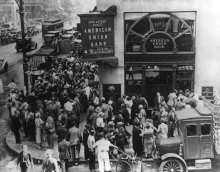User:Domusaurea/talks/Amsterdam - Public History conference 2014
Ultimate Public History, or how historians can make peace with Wikipedia
October 24, 2014, University of Amsterdam
Rosenzweig, Roy. "Can history be open source? Wikipedia and the future of the past." The Journal of American History 93.1 (2006): 117-146.
Limitations of Wikipedia (Rosenzweig)
[edit]"denigration of expertise"
[edit]... Wikipedia (like encyclopaedias in general) summarizes and reports the conventional and accepted wisdom on a topic but does not break new ground. And someone whose expertise rests on having done extensive original research on a topic gets no particular respect. (p. 121-122)
- First pillar: "Wikipedia is an encyclopedia" = no original research, "outsources" established, authorial and verifiable information - references!
- Authorship X Authority: "commons-based peer production" (Benkler) + "pseudonimity" (Jimmy Wales)
- Example: my userpage (en)
- Example: "Domusaurea's" first article: Ammianus Marcellinus (in Portuguese)
Popular culture and bias
[edit]"geek priorities" have shaped the encyclopedia (p. 127)
- Example: List of voice actors in the Grand Theft Auto series
- Biases: English speaking, Western, male
- For History:
Wikipedia is surprisingly accurate in reporting names, dates and events in US history. (p. 128)

Antiquarianism/factualism
[edit]Wikipedia's view of history is not only more anedoctal and colorful than professional history, it is also - again like much popular history - more factualist. (p. 142)
Professional historians might find an account accurate and fair but trivial; that is what some see as the difference between history and antiquarianism. Thus, the conflict between professionals and amateurs is not necessarily a simple one over whether people are doing good or bad history but a more complex (and more interesting) conflict about what kind of history is being done. (p. 141)
Style
[edit]Good historical writing requires not just factual accuracy but also a command of the scholarly literature, persuasive analysis and interpretations, and clear and engaging prose. (p. 129)
Advantages of Wikipedia (Rosenzweig)
[edit]Everyone uses (esp. students)
[edit]Free and accessible
[edit]- 3rd pillar - copyrights
- Democratization of access to information (vs. digital divide)
- Preservation of endangered languages
- Example: People are Knowledge - documentary on Vimeo

Develops skills
[edit]- Writing and researching
[A PhD student and Wikipedia editor] "I use it primarily to practice writing for a non-academic audience, and as a way to solidify my understanding of topics (nothing helps one remember things like rewriting it)". (p. 143)
- Information literacy
[What to do] Spend more time teaching about the limitations of all information sources, including Wikipedia, and emphasizing the skills of critical analysis of primary and secondary sources. (p. 137)
Solutions to Rosenzweig's ideas
[edit]
- In Brazil since 2011
- Example: undergraduate course - A História Romana na Wikipédia
- Example: workshops - Ancient greek vases
- Example: community support - Ambassador Program
Wikisource (en)
[edit]What if we organized a similar [to Genealogy projects] "distributed transcribers" to work on handwritten historical documents that otherwise will never be digitized? (p. 144)
- Example: Manuscrito 512 (in Portuguese)
Wikiversity (en)
[edit]Could we, for example, write a collaborative U.S. history textbook that would be free to all our students? (p. 145)
- Example: Historical Introduction to Philosophy
- Example: National Library and National Archives of the Netherlands
Thank you!
Contact: wikipediaunirio at gmail dot com
